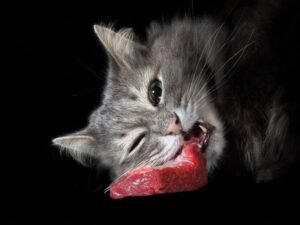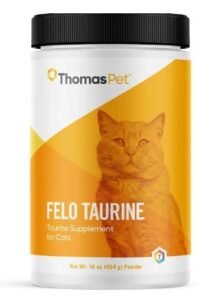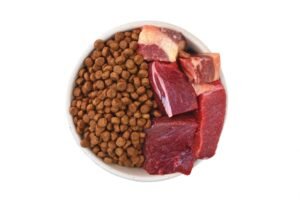Most cat lovers are likely familiar with taurine as an ingredient in cat food. So, you might wonder why do cats need taurine? Taurine is an amino acid that aids your cat to stay healthy by preventing many major health problems.
Taurine occurs freely in many body cells, tissues, and bile. To understand why cats need taurine, let’s briefly examine amino acids and their function in the cat’s body.
What functions do amino acids serve?

Amino acids assist the body cell in the production of protein required for the proper functioning of all parts of the human and cat’s body. The acid helps with the metabolic process and play a crucial role in the transportation of nutrient and storage.
When proteins are broken down, amino acids are left. The cat’s body utilizes amino to grow and repair body tissues. Therefore, the cat’s body produces a significant number of amino acids.
However, it needs to obtain others from food.
Types of amino acids
Amino acids are classified into three groups.
- Essential amino acids:Essential amino acids cannot be produced by the cat’s body. As a result, they must come from food.
- Nonessential amino acids: They can be produced by the cat’s body even though their bodies can make them
- Conditional amino acids: These acids are only essential in times of illness and stress.
Can cats synthesize taurine from other amino acids?
Taurine is an essential amino acid in cats. That means they are required in large amounts in the cat’s diet. However, while omnivores like humans and dogs can synthesize enough taurine from other amino acids, cats can barely do the same.
Although cats can have some taurine, the enzyme required to synthesize it from cysteine to taurine is lacking. Therefore, cats need reasonable amounts of essential amino acids in their food; otherwise, their health may begin to deteriorate.
Causes of taurine deficiency in cats

Taurine deficiency occurs when you feed your cat food on a commercial or raw diet that does not contain taurine. Similarly, your cat may risk developing taurine deficiency if she enjoys sampling dog food.
Since dogs can create their taurine, their food does not contain taurine. So, a steady dog diet for your cat could lead to taurine deficiency.
Effects of taurine deficiency in cats
Taurine deficiency in cats can cause some severe health issues for cats. Here is a look at some of them:
1. Blindness
One of the earliest known diseases of taurine deficiency is central retina degeneration (CRD).
Taurine plays a vital role in the structure of rods and cones within the retina. A lack of taurine can make these structures degrade, leading to vision loss.
Unfortunately, these cells can not be regained once they are lost. However, early treatment with taurine supplementation can slow the progression of the disease.
2. Dilated Cardiomyopathy
Dilated Cardiomyopathy affects the heart and causes it to enlarge, affecting its ability to pump blood effectively.
Taurine within the heart muscles helps maintain suitable calcium levels and other charged particles on either side of the cell membrane.
Taurine deficiency prevents the heart from contracting normally, leading to congestive heart failure. Cats suffering from this condition may also experience congestive heart failure due to pumping problems.
3. Reproductive failure
A taurine deficiency can lead to reproductive failure in cats. As a result, affected cats would not be able to produce kittens.
4. Tooth decay
One crucial reason cats need taurine is that it keeps their teeth strong and healthy. A lack of taurine would cause cavities in the teeth, thereby leading to decay.
5. Gastrointestinal issues
Taurine aids the cat’s body in producing bile salts required for fat digestion. A lack of taurine would see your cat to develop gastrointestinal issues, including diarrhea and indigestion.
6. Immune system disorders
The immune system helps your cat ward off disease-causing organisms. However, a taurine deficiency could give rise to a range of immune system disorders in your cat, making them experience frequent illnesses.
7. Diabetes
Taurine helps the cat’s body to regulate blood sugar concentration. Your cat may develop diabetes due to a lack of taurine in her diet.
Diagnosis of taurine deficiency in cats

Diagnosing taurine deficiency is quite a difficult task. To begin, your veterinarian would need a comprehensive medical history and a recounting of the progression of any symptoms.
You must provide your veterinarian with a documented record of your cat’s diet ingredients. Subsequently, your veterinarian will perform a complete blood panel and urinalysis by taking a blood sample from your cat.
Because taurine level does not always result in elevated levels, these tests may help rule out diseases that may manifest related symptoms. In addition, your veterinarian may conduct other tests based on your cat’s symptoms.
These tests may include an eye examination to check for retinal degeneration.
Chest X-rays or ultrasounds can also help rule out any severe heart defect. Your veterinarian may also want to conduct an electrocardiogram which helps monitor the electrical functioning of your cat’s heart for normal rhythm.
Treatment of taurine deficiency in cats
The primary treatment for taurine deficiency in cats is the supplementation of taurine.
Given the severity of the symptoms and the length of time the cat has suffered, ongoing supplementation may be required to correct a taurine deficiency.
Your veterinarian may also suggest the inclusion of synthetic taurine in your cat’s diet.
This is necessary because dietary taurine alone cannot resolve the situation, especially when a taurine deficiency has progressed significantly.
Including meat in your cat’s regular diet can also help increase their taurine intake.
Note that taurine is naturally found in uncooked meat, and cooking food could degrade or destroy taurine.
Cats that depend solely on homemade food or a vegan diet are at more risk of developing severe health challenges associated with taurine deficiency.
Why Do Cats Need Taurine? Final Comments
Taurine is a type of amino acid considered the building block of all proteins. Taurine is essential for heart muscle function, good vision, and digestion.
Feline lovers must endeavor to provide their cats with a diet that supports taurine supplementation to keep them healthy.

